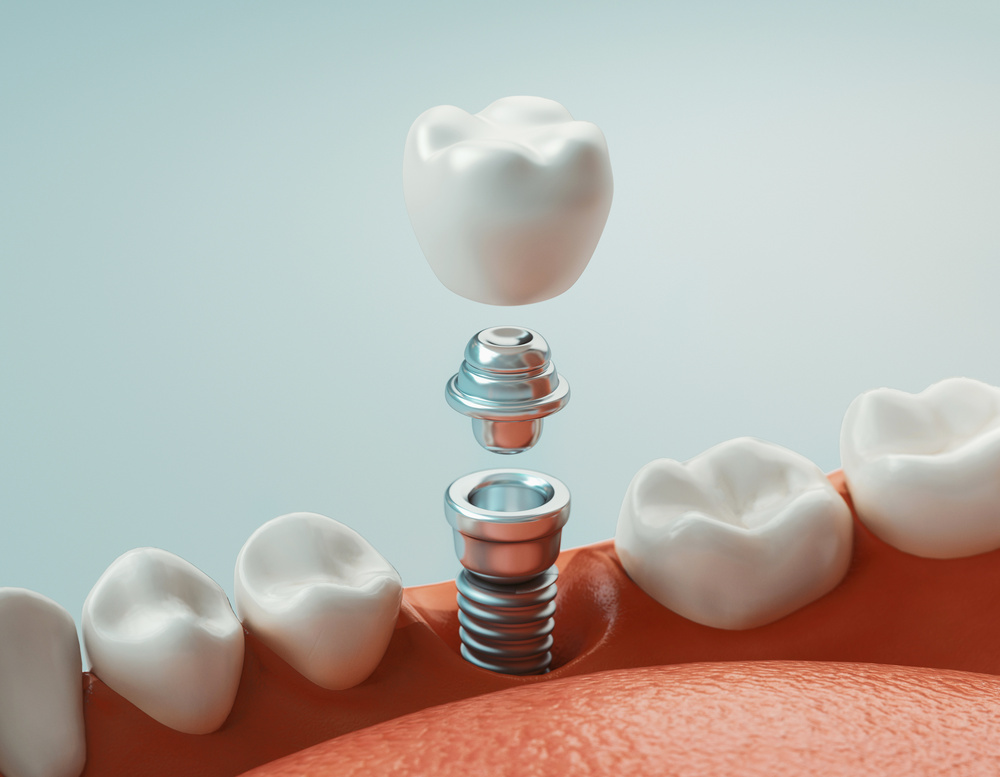Dental implants have revolutionized tooth replacement options, offering a long-term solution for missing teeth. They mimic the function and appearance of natural teeth, allowing you to maintain oral function and a beautiful smile.
Whether you’ve lost a tooth due to injury, decay, or other health conditions, dental implants provide a sturdy foundation for new teeth.
Keep reading to learn how dental implants work and what you can expect from the process.
Understanding the Dental Implant Process
The dental implant process involves several critical steps to ensure a successful outcome. It starts with a thorough evaluation of your oral and overall health, setting the stage for a customized treatment plan tailored to your needs.
- Initial consultation: During this visit, your dentist reviews your medical history, performs a physical examination, and may request imaging tests like a CT scan. These steps help determine if you have enough healthy bone structure and are an ideal candidate for dental implants.
- Treatment planning: If your jawbone is insufficient to support the implant, your dentist may recommend procedures like bone grafting to strengthen the area. This planning phase is essential for ensuring the implant can be securely placed.
- Surgical placement: The implant post, usually made of titanium, is surgically inserted into the jawbone. This post acts as a sturdy foundation for the replacement tooth, integrating with the bone over time.
- Healing and osseointegration: After the surgery, the implant post needs time to fuse with the jawbone through a process called osseointegration. This stage is crucial for ensuring the stability and durability of the implant.
- Final Restoration: Once healing is complete, a custom-made dental crown is attached to the implant post, restoring both the function and appearance of your natural tooth.
When choosing a dentist for the dental implants procedure, opt for an experienced cosmetic dentist who regularly performs Cosmetic Dental Procedures. Their expertise will ensure your implant placement is done with precision, leading to a higher success rate and a faster healing process.
Choosing the Right Implant Placement
Selecting the appropriate dental implant placement is essential for ensuring the long-term success of your dental restoration. The type and location of implant placement depend on factors like the number of missing teeth and the condition of your jawbone.
The following are common types of implant placement:
- Endosteal implants: These implants are placed directly into the jawbone and are the most widely used. They provide a strong foundation for a single tooth or multiple teeth, offering stability and a natural feel.
- Subperiosteal implants: Positioned under the gum but above the jawbone, these implants are ideal for patients with insufficient bone height who can’t undergo bone grafting. They offer a less invasive option while still providing adequate support.
- Zygomatic implants: These implants are anchored in the cheekbone and are used in cases where there’s severe bone loss in the upper jaw. They’re a solution for patients who may not be candidates for traditional implants due to bone deficiencies.
Each type of implant placement has its benefits and potential risks. Consulting with a maxillofacial surgeon or an oral surgeon who specializes in implant dentistry can help you choose the best option for your specific needs.
Preparing for Dental Implant Surgery
Getting ready for dental implant surgery involves more than understanding the procedure; it also requires physical and mental preparation.
To help you feel confident and ready, here are the steps to consider:
- Medical evaluation: Before your surgery, it’s essential to manage any existing health conditions. This ensures your body is in the best possible condition to heal after the implant is placed.
- Stop smoking: Smoking can interfere with the healing process, reducing the likelihood of a successful implant. Quitting at least a few weeks before surgery can improve your recovery.
- Plan for transportation: Since dental implant surgery often involves sedation, it’s crucial to arrange for someone to drive you home afterward. This ensures your safety and comfort as you recover from the anesthesia.
- Adjust your diet: In the days leading up to your surgery, prepare by stocking up on soft foods that’ll be easy to eat while your mouth heals. Foods like yogurt, applesauce, and mashed potatoes are good options.
Following these steps will help you approach your dental implant surgery with confidence and ensure a smoother recovery process.
The Healing Process and Aftercare
After dental implant surgery, proper aftercare is essential to support healing and ensure the long-term success of your implants. Taking the right steps during this period will help you recover smoothly and avoid potential complications.
To ensure a successful healing process, follow these important guidelines:
- Oral hygiene: Maintain a clean mouth by brushing and flossing regularly. Practicing good oral hygiene is crucial for supporting the healing process. However, be gentle around the surgical site to avoid irritation or damage to the healing tissue.
- Follow-up visits: Attend all scheduled follow-up appointments. These visits allow your dentist to monitor the healing process, ensure the implant is integrating properly with the jawbone, and address any concerns early on.
- Diet: Focus on soft foods that don’t require much chewing, especially in the days immediately following the surgery. Avoid hard or sticky foods that could put stress on the implant site.
- Pain management: Use over-the-counter pain relievers as recommended by your dentist to manage any discomfort. If you experience severe pain or unusual symptoms, contact your dentist promptly.
- Protect the area: Avoid putting pressure on the implant site, such as by chewing on that side of your mouth or using it to hold objects.
Proper care during the healing process will lead to a smoother recovery and increase the longevity of your dental implants.
Benefits of Dental Implants Over Other Tooth Replacement Options
Dental implants stand out as a superior choice for tooth replacement due to their ability to replicate the function and appearance of natural teeth.
For those considering their options, the following are the benefits that dental implants offer:
- Longevity: Dental implants are designed to be a long-lasting solution, often enduring for decades with proper care. Unlike dentures or bridges, which may need to be replaced or adjusted over time, implants provide a durable, permanent fix.
- Bone health preservation: One of the critical advantages of dental implants is their ability to preserve bone structure. When a tooth is lost, the jawbone can begin to deteriorate over time. Implants help maintain bone density by stimulating the jawbone, preventing the bone loss that often accompanies missing teeth.
- Natural appearance and feel: Implants are crafted to match the look and feel of your natural teeth closely. This makes them nearly indistinguishable from the surrounding teeth, providing a more aesthetically pleasing result compared to dentures or bridges.
- Improved functionality: Dental implants restore full oral function, allowing you to eat, speak, and smile confidently. Unlike removable dentures, implants remain securely in place, eliminating concerns about slippage or discomfort while chewing or talking.
- Protection of adjacent teeth: Unlike traditional bridges, which may require the alteration of adjacent teeth, implants stand independently. This means that your natural teeth remain intact and healthy, contributing to overall better oral health.
Choosing dental implants as your tooth replacement option provides a long-term, reliable solution that supports the functionality and appearance of your smile, enhancing your quality of life.
Final Thoughts
Dental implants are more than just a cosmetic enhancement—they’re a proactive step toward preserving your oral health and quality of life. Understanding the process, preparing adequately, and committing to proper aftercare ensure you achieve the best possible outcome. This investment in your dental health is about reclaiming the full function, confidence, and peace of mind that come with a complete, healthy smile.








